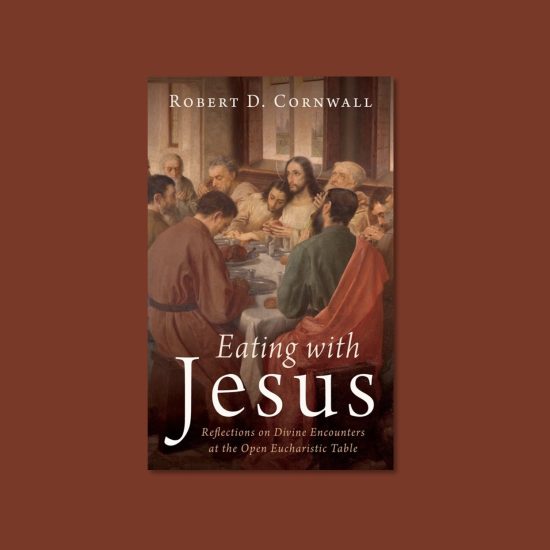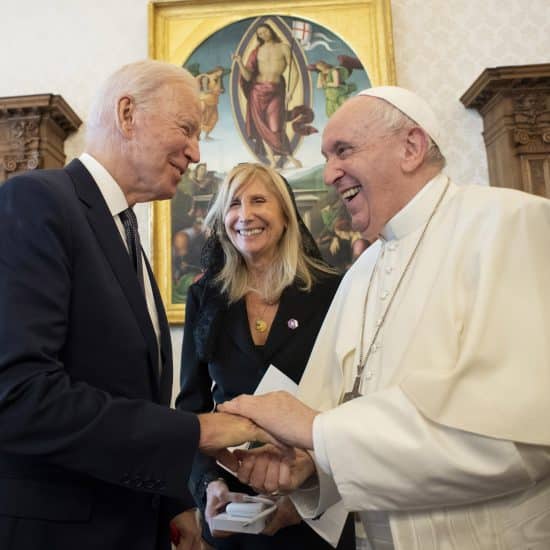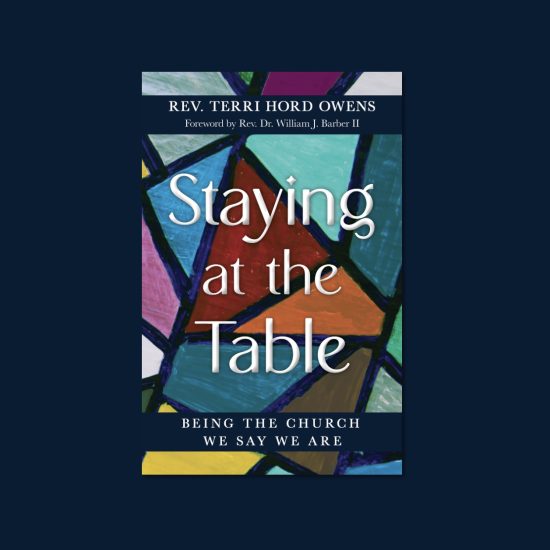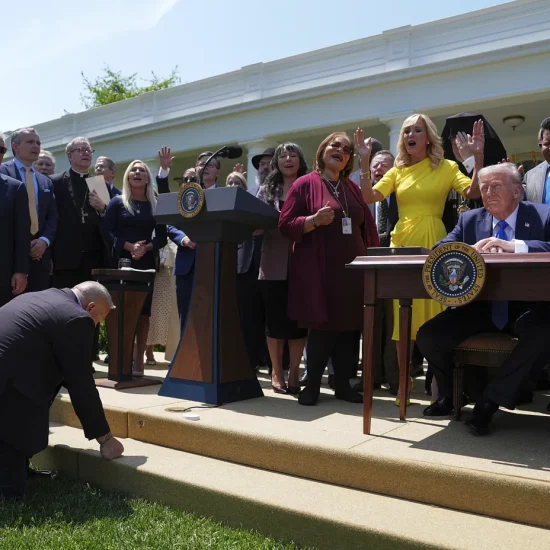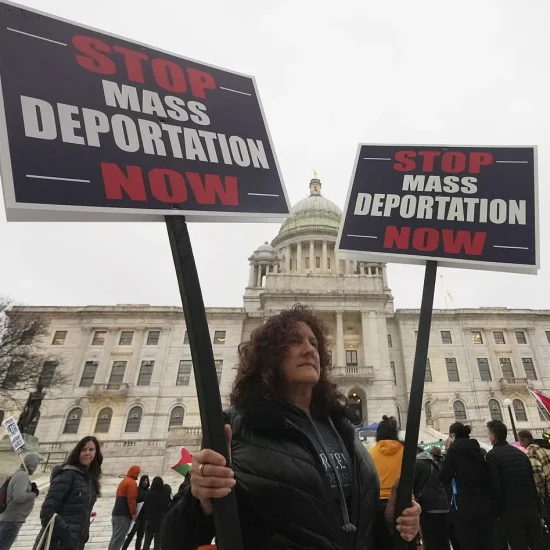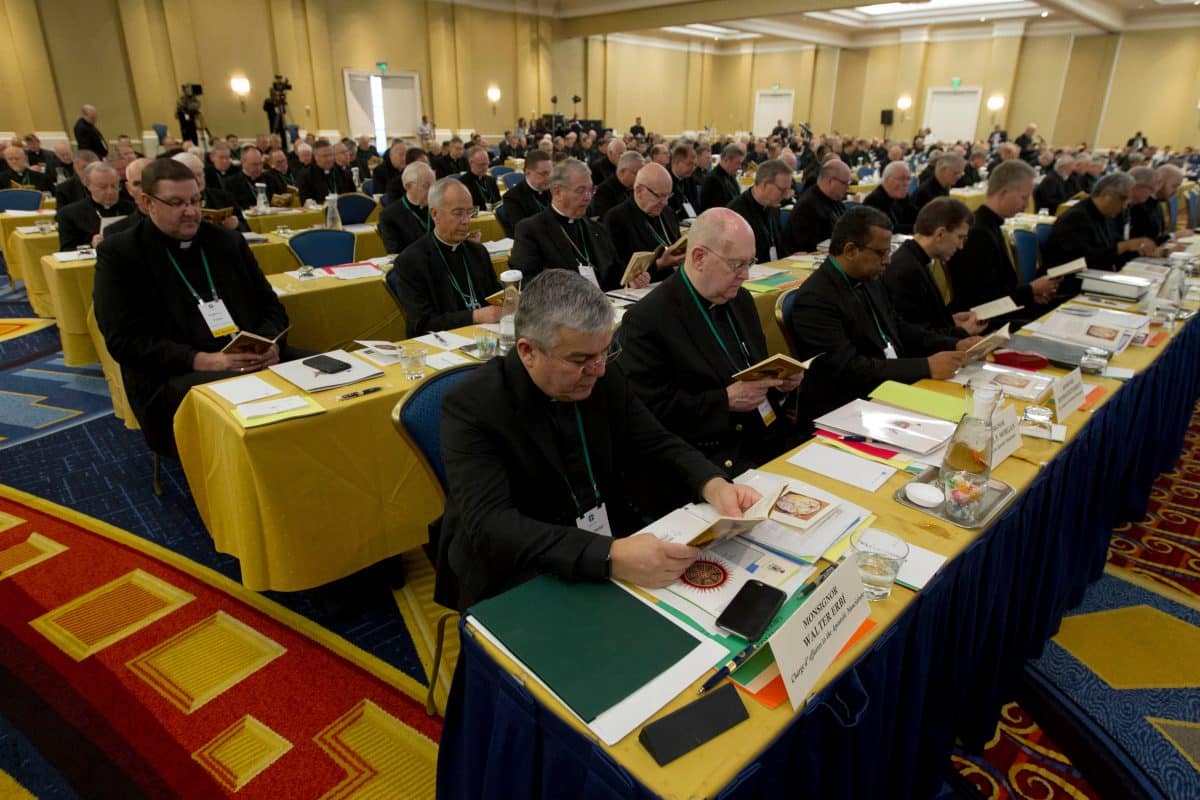
(RNS) — The U.S. Conference of Catholic Bishops’ spring meeting begins Wednesday (June 16) with as much interest for political observers as religious ones, as what is typically a mundane clerical confab takes up an escalating debate over President Joe Biden and Communion.
Driven mostly by bishops put in place by pontiffs who preceded Pope Francis, the question that will dominate news coverage of the meeting will be a vote on whether to commission a document regarding the Eucharist. The document, in turn, will likely touch on a more specific concern: whether politicians who back a right to abortion, which the Catholic Church opposes, should be denied the central sacrament of the church until they repent that position.
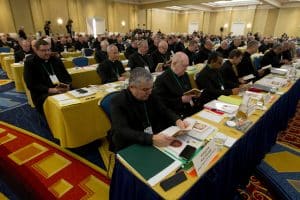
Catholic bishops participate in a morning prayer June 11, 2019, during the U.S. Conference of Catholic Bishops’ spring 2019 meetings in Baltimore. (Jose Luis Magana/Associated Press)
The decades-old disagreement among clerics has potentially far-reaching political implications: Not only are most Catholics in Congress Democrats who back abortion rights, but for the second time in history the country’s president, Biden, is also Catholic — one who talks about his faith frequently and attends Mass virtually every week.
Bishops are unlikely to resolve the simmering controversy as they convene over Zoom for three days. But for those tuning in to see (possible) fireworks, here’s a primer on what to watch.
A push for a Communion ban document by firebrand conservatives
In 2004, a small coterie of bishops suggested withholding the Eucharist from Catholic Democrat and then-presidential candidate John Kerry because of his abortion stance. Kerry managed to avoid such ecclesial embarrassment, but the controversy dogged his campaign nonetheless.
The conversation reemerged in 2019, when then-presidential candidate and enthusiastic Catholic Biden was reportedly denied Communion by a priest in South Carolina while on the campaign trail. It garnered little attention at the time, but the debate roared back into the public square shortly after media outlets declared Biden the 2020 victor: Whereas the Vatican celebrated Biden’s ascension as the country’s second Catholic president, the USCCB issued a cautious statement that expressed ambivalence about Biden’s abortion stance and assigned a committee to study their response to this election.
The committee was eventually disbanded, but the controversy has continued to escalate, driven chiefly by conservative Catholics and a cadre of conservative-leaning bishops. In May San Francisco’s Archbishop Salvatore Cordileone unveiled a 17-page pastoral letter arguing that public officials who back abortion rights legislation should be barred from receiving the sacrament.
Few bishops have made their position on the matter as clear as Cordileone, but a recent Religion News Service survey of U.S. bishops found several echoing Cordilieone or agreeing on the need for a discussion of the issue.
As the conversation gets going, look for Cordileone; Bishop Thomas Paprocki of Springfield, Illinois; Archbishop Joseph Naumann of Kansas City, Kansas; and others to speak out in favor of the proposal — or at least stressing the importance of the option.
A more reticent liberal-leaning wing with the support of the laity
Getting less attention in the debate are those bishops in the sizable liberal wing of the USCCB, who have quietly advocated for a different approach to Communion.
The two also reportedly joined dozens of other bishops in signing a letter in May asking the USCCB to suspend its planned conversation about “Eucharistic coherence” at the spring meeting. (It didn’t work: The USCCB’s president, Archbishop Jose Gomez of Los Angeles, is going forward with the conversation anyway.)The loudest is Bishop Robert McElroy of San Diego, who responded to Cordileone’s push in the pages of America Magazine last month, arguing that the Eucharist shouldn’t be “weaponized and deployed as a tool in political warfare.” This echoed a sentiment by Cardinal Wilton Gregory, who oversees the Archdiocese of Washington and participated in Biden’s inauguration events: Gregory told RNS in December that he intends to continue offering Biden the Eucharist because he doesn’t “want to go to the table with a gun on the table first.”
Bishops who are wary of a Communion ban appear to have the support of the laity: A March 2021 Pew Research survey found that most Catholics — 67% — believe Biden should be allowed to receive Communion irrespective of his views on abortion.
But with rare exceptions — Bishop Alberto Rojas of the Diocese of San Bernardino, for one — liberal-leaning bishops have been generally less vocal on the issue than their conservative brethren, with few staking out a firm position against denying Biden and other Catholic Democrats Communion.
Look for some of these bishops to finally make their voices heard in the coming days.
Vatican awkwardness
One of the more striking factors in the Communion debate isn’t dissent among U.S. bishops (that’s not exactly new), but the striking contrast between the Vatican and conservative bishops who have pushed a ban despite pushback from the Holy See.
Francis hasn’t weighed in directly, but in a June 6 homily he adapted one of his most oft-cited lines about the Eucharist, telling a group of 200 in St. Peter’s Basilica that the sacrament “is not the reward of saints, but the bread of sinners.” (The original line, from his his 2013 apostolic exhortation “The Joy of the Gospel,” is: “The Eucharist, although it is the fullness of sacramental life, is not a prize for the perfect but a powerful medicine and nourishment for the weak.”)
But Gomez already had in hand a letter from Cardinal Luis Ladaria, the prefect for the Congregation for the Doctrine of the Faith, the Vatican’s theological watchdog, suggesting the USCCB tap the breaks on the Communion discussion.
Among other things, Ladaria said it would be “misleading” for the USCCB to suggest abortion and euthanasia are “the only grave matters of Catholic moral and social teaching that demand the fullest level of accountability on the part of Catholics.”
Gomez responded by pushing forward with the conversation anyway, but the Vatican kept pace, welcoming Kerry himself, now the White House’s special envoy on climate change, shortly thereafter. The meet-and-greet attracted attention in part because the pope flashed an unusually glowing grin during the photo op.
Some more liberal-leaning bishops have invoked Francis and the Vatican’s letter when discussing Communion, and the pope’s influence is likely to loom large over the proceedings this week.
Keep things in perspective
Some media outlets are spinning the USCCB spring meeting as a face-off between the liberal-leaning pope and Trump-loving prelates spoiling for a fight, and Communion just a poison pill that will give the conservatives cause to rebuke the Holy Father.
Technically, bishops aren’t even voting on whether or not to deny Communion to politicians who back abortion rights. The draft of “a formal statement on the meaning of the Eucharist in the life of the Church” would likely not appear until fall, when the bishops meet again. And any document produced won’t override each bishop’s individual power to deny Communion or not in his own diocese.
That said, the conversation could impact Biden and other Catholic Democrats politically, or even embolden bishops in their home dioceses to deny them Communion. The incoming bishop in Biden’s home diocese of Wilmington, Delaware, for instance, did not directly answer when asked in late April whether he would deny Biden the Eucharist, saying only that he hopes to dialogue with the president but that, as a bishop, he is “called to teach the fullness and the beauty of the Catholic faith.”
Those other things on the agenda
Ample drama and press notwithstanding, the USCCB gathering isn’t just about Communion. The prelates are also slated to consider a canonization, a proposal to develop a pastoral framework for young people, a statement regarding Native American and Alaska Native ministry, a slate of new liturgical translations, and a framework for marriage and family life ministry developed in the spirit of “Amoris Laetitia,” Francis’ 2016 exhortation.
The last measure could involve discussion of hot-button topics such as same-sex marriage and Communion for divorced and remarried Catholics, although Catholic analyst and RNS columnist the Rev. Tom Reese predicted this week that the document will likely steer clear of such conversations.

